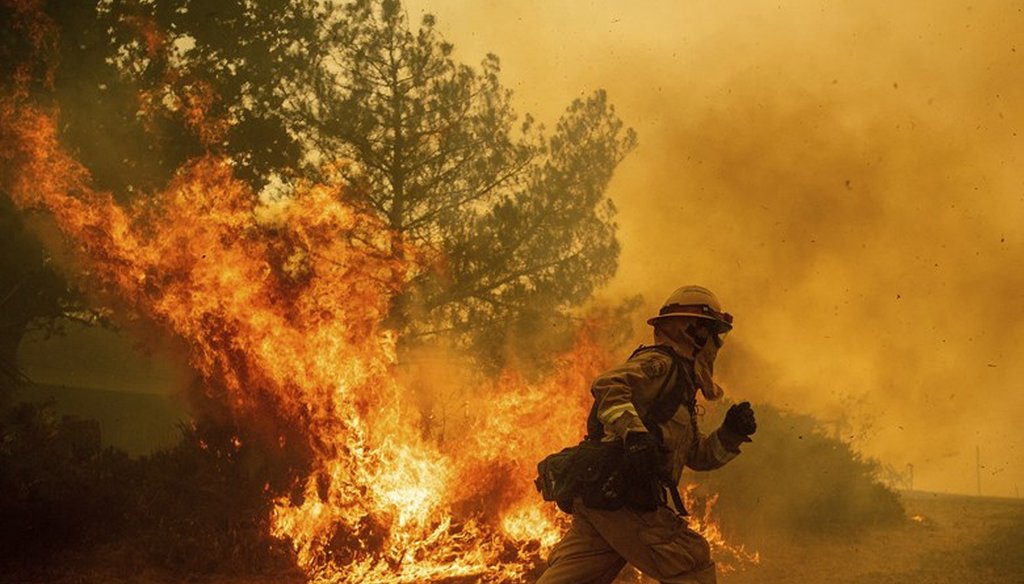Stand up for the facts!
Our only agenda is to publish the truth so you can be an informed participant in democracy.
We need your help.
I would like to contribute

A firefighter runs while trying to save a home as a wildfire tears through Lakeport, Calif. on Tuesday, July 31, 2018. AP Photo / Noah Berger
California’s current year-round fire season is producing more extreme and destructive blazes than in the past. Two recent examples are the Carr Fire that’s destroyed more than 1,000 homes in and near Redding — it's already the sixth-most destructive in state history — and the Ferguson Fire that forced the closure of part of Yosemite National Park in late July, at the height of tourist season.
As these fires grow in frequency and severity, the state’s cost to fight them is also increasing — dramatically.
Firefighting costs have more than tripled from $242 million in the 2013 fiscal year to $773 million in the 2018 fiscal year that ended June 30, according to the California Department of Forestry and Fire Protection, or CalFire.
Those figures, along with the fact that large fires are starting earlier in the year, has state officials worried.
"In past decades, we may have seen a fire that we’re seeing now (such as the Carr Fire), in August or September," CalFire Director Ken Pimlott said during a press conference earlier this week. "We are routinely now seeing fires reach 100,000 acres several times in one month and it’s only July, so we have a long way to go in this fire season, and as we saw last year fire season can go right up through December."

The Carr Fire tears through Shasta, Calif., Thursday, July 26, 2018. Fueled by high temperatures, wind and low humidity, the blaze destroyed multiple homes and at least one historic building. Noah Berger / AP Photo
Recent fires among state's most destructive
In seven of the past 10 years, the state’s wildfire costs have surpassed CalFire’s emergency fund budget.
Since 2008, California has experienced nine of the top 20 most destructive wildfires in its history in terms of structures burned, according to a CalFire report. Two more of the most destructive fires took place in 2007.
Gov. Jerry Brown at a press conference on Aug. 1 warned that California may be in trouble if these mega fires continue to ravage the state.
"There’s money in this year’s budget. We’re enjoying the ninth year of recovery … But I would say things will get much tighter in the next five years, as the business cycle turns negative and as the fires continue," he said.
One quarter of funds spent in one month
In July alone, the state spent more than $114 million fighting fires, added CalFire spokesperson Daniel Berlant. That’s already about one quarter of its emergency fire budget for the fiscal year that ends in June 2019.
That doesn’t count the vast sums spent by the federal government fighting fires across the state. The U.S. Forest Service’s tab just to fight the Ferguson Fire, which was first reported on July 13, has surpassed $73 million, according to a tweet by the federal agency in early August.
Brown also stressed that California must continue to lessen the effects of climate change, which is blamed for exacerbating the warm and dry conditions that lead to wildfires.
"We’re in uncharted territory," the governor said. "Since civilization emerged 10,000 years ago, we haven’t had this kind of heat condition, and it’s going to continue getting worse. That’s the way it is."
Suggest a fact check
Have you heard a specific claim about California wildfires you want fact-checked?
Suggest an idea, including who made the statement, when and where at [email protected], or contact us on Twitter or Facebook.
For full coverage of California's wildfires, visit capradio.org
Our Sources
Gov. Jerry Brown and CalFire Director Ken Pimlott, press conference, Aug. 1, 2018
Daniel Berlant, CalFire spokesman, interview, Aug. 1, 2018
California Department of Forestry and Fire Protection, Top 20 Most Destructive California Wildfires, Aug. 3, 2018
California Department of Forestry and Fire Protection, Number of Fires and Acres, January 2018
Sacramento Bee, California runs up huge firefighting bill early in season, July 28, 2018





















































